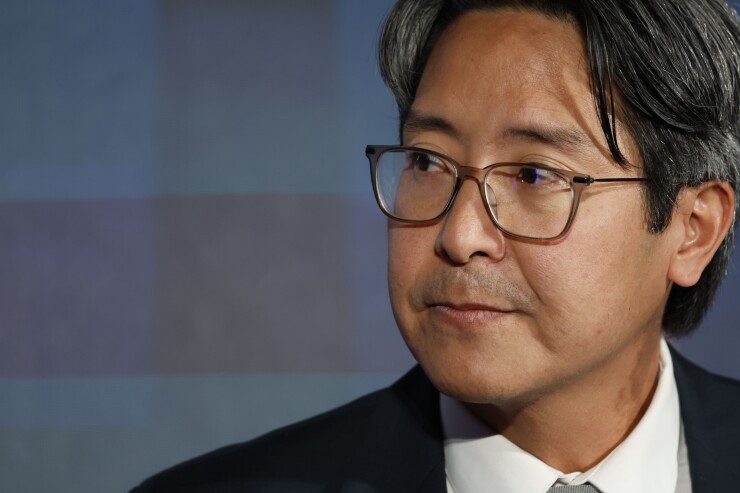
WASHINGTON — The Federal Deposit Insurance Corp. board Thursday reviewed two dueling proposals from two of its board members that would revise how the agency oversees asset managers' control over banks.
The pair of proposals — from Consumer Financial Protection Bureau Director Chopra and FDIC board member Jonathan McKernan, respectively — share a common concern about the influence of asset managers over the banking sector, but take unique approaches to mitigating that concern.
FDIC board member McKernan — who has been
"I would describe this as cautious incrementalism, maybe even to the extreme," he said. "This plan doesn't require a change in law, just requires that we enforce existing law, [nor does it] consider, assess or affect any of the actively managed funds."
In remarks unveiling his
He detailed how in September 2020, the Federal Reserve Bank of San Francisco approved a Maryland shell corporation's acquisition of the institution's parent company Farmington Bancorp, effectively giving the shell company control over the firm. Later, he noted Farmington State Bank joined the Federal Reserve System in June 2021, and the following year, Alameda Research purportedly acquired a "9.9%" stake in Farmington's bank holding company for $11.5 million, significantly inflating the bank's valuation despite its modest assets and equity. The Bankman-Fried affiliates were able to effectively control the rural state-chartered bank for speculative crypto asset activities while evading FDIC oversight.
Under the Change in Bank Control Act, transactions at the holding company level are typically reviewed by both the Federal Reserve and the primary banking supervisor. However, Chopra pointed out that the FDIC had instituted rules exempting its review of such transactions at the holding company level years ago, deferring instead to the Federal Reserve's judgment. The CFPB director noted that Farmington also avoided engaging with the FDIC at all due to "charter shopping." By joining as a member bank of the Federal Reserve System, the firm avoided oversight by the FDIC.
To address these kinds of issues, Chopra unveiled a draft notice of proposed rulemaking that would reinstate the agency's role in reviewing — along with the Federal Reserve Board — acquisitions of voting securities of a holding company with an FDIC supervised subsidiary under the Change in Bank Control Act.
"While the Federal Reserve Board took an enforcement action last year against Farmington to wind it down," Chopra said, "it is impossible to ignore the steps taken to evade FDIC oversight and we need to really have the courage to learn from this and act accordingly."
Chopra also agreed with McKernan's concern regarding large asset managers increasingly controlling stakes in FDIC-insured banks, expressing distaste with the fact that under current Federal Reserve rules, asset managers can occupy a seat on bank boards and still nominally maintain the moniker of a "passive investor" in the firm.
"It makes sense for the FDIC to review the substance of its own passivity agreements, take a more active role to determine whether these agreements are being adhered to and take action if asset managers are evading our oversight," Chopra noted. "It's also critical we make sure that passivity agreements aren't fake paperwork exercises."
Board members mostly voted along partisan lines on the proposals. The other Republican board member, FDIC Vice Chair Travis Hill, supported McKernan's proposal, while FDIC Chair Gruenberg supported Chopra's proposal. Acting Comptroller of the Currency Michael Hsu, however, opposed both proposals, saying the board needed to conduct more information gathering before pushing through consequential rules.
Hsu also noted that given the extent to which the three major banking agencies may be currently taking unique approaches to evaluating bank control, it would be unwise to reallocate FDIC resources to monitoring asset manager compliance at the expense of its primary function: supervising banks.
His vote meant neither proposal could advance out of the meeting.
"The key question centers on how these things impact the safety, soundness and resolvability of banks [and] further research, analysis and debate are clearly needed," he said. "I believe any proposed rulemaking — which should be done on an interagency basis — would benefit from such discussion and debate occurring prior to its issuance."
FDIC staff did provide definitive updates in the agency's first semiannual review of the year on its efforts to replenish the Deposit Insurance Fund. Barring unexpected banking industry developments, agency staff reported the DIF is likely to reach the legally required level in 2026, well ahead of the deadline of September 30, 2028. The DIF is required by statute to maintain a 1.35% ratio of the fund balance in relation to insured deposits at FDIC-backed institutions.






